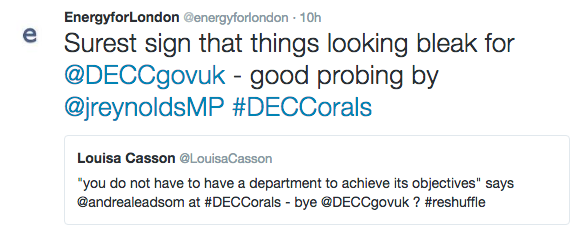14 July 2016: The Department of Energy and Climate Change (DECC) is no more. Rumours started early on in the day via a tweet from the Editor of ConservativeHome:
This was followed shortly after by Energy Minister Andrea Leadsom failing to deny rumours during DECC Oral Questions session in the House of Commons.
All was confirmed by the afternoon. DECC was to merged with BIS to form the new Department of Business, Energy and Industry Strategy, with a new Secretary of State, Greg Clark, appointed.
Ed Miliband, the first Secretary of State for DECC, who helped establish the department in 2008, was not impressed:
Prior to the formation of DECC, the majority of the energy portfolio (gas, oil, electricity, renewables, generation, coal etc) was lead by the department for business, but energy efficiency policy and climate change policy was held in the department for environment. Tensions often arose between the two ministries as policies to achieve carbon goals were viewed as impacting on industry, especially energy intensive industries; this was most notable in the early to mid-2000s when the UK and then EU Emissions Trading Schemes were being introduced. Tax instruments lobbed in by the Treasury from time to time further muddied the water (the Climate Change Levy being the most notable). DECC was brought into existence to better coordinate the delivery of these policies across government and the introduction shortly after its formation of the Climate Change Act gave the department additional weight. A scant eight years later, the department has now been scrapped, returning back to the business department – but at least energy and climate policy are staying together there.
A potential ‘silver lining’ from Energy for London’s perspective is that the new department has Greg Clark in charge. Greg was previously Conservative Shadow Secretary of State for Energy, and a keen advocate of decentralised energy. In government he led on the Government’s cities agenda as a Minster before rising to the post of Secretary of State at DCLG. Comments made in the following 2013 interview provide some hope that he might bring alive the cities/energy agenda in his new role, something that was significantly missing from DECC’s priorities:
“You’ve recently said that “Cities are the building blocks of the global economy” and that the drive for growth – for Britain’s economic future – needs to be most energetic in our cities. But with cities generating 70 per cent of the world’s energy consumption and carbon emissions, despite accounting for only 2 per cent of the Earth’s surface, doesn’t sustainability have to be of paramount importance?
Cities have the potential to be the most sustainable places on Earth because you have large numbers of people living and working in very close proximity to each other in a concentrated geographical area. The precise conditions that you need to have networks in public transport for example, that can cleanly and efficiently get people from one place to another. As cities are changing there is a lot of new development there that can be from the outset that can be designed in the highest environmental standards. All the conditions are there in cities to be a great contributor to environmental progress, but this involves planning. We know there are cities around the world which are not as sustainable as they could or should be, where people have to travel very long distances in very wasteful ways environmentally, but done properly, cities can not only be engines of growth economically, but also instrumental in environmental progress.“





